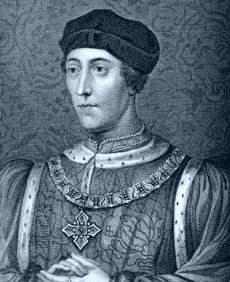Henry VI
When Henry was crowned at the age of nine months, he was briefly king of both France and England, thanks to the spectacular achievements of his father (Henry V).
Henry VI's long and troubled reign* may be divided into three periods*:
- relative stability under a regency*;
- military defeats and growing unrest under Henry's personal rule (see the next page);
- civil wars, in which the King became a
-
mere figurehead in factional power struggles.
The three plays on Henry VI are among Shakespeare's first, and were probably written in the late 1580s. Politically, they are conservative, dramatizing the Tudor Myth, and showing the chaos that follows the disruption of divine order.
(Click for a list of the Histories)
Footnotes
-
Henry's troubled reign
After nearly forty years as king (1422-61) the throne was seized by Edward IV; Henry was restored again briefly (1470-71), then murdered in the Tower (the murderer is traditionally believed to have been Richard of Gloucester, later Richard III).
-
The corresponding plays
The periods roughly correspond to the three parts of Shakespeare's Henry VI: Part One (1422-44); Part Two (1445-55); and Part Three (1455-71).
-
The regency
The dominant figures in Henry's early reign were his strong and capable uncles (dukes John of Bedford and Humphrey of Gloucester) and his grand-uncle, Cardinal Henry Beaufort.
Acting as Regent of France, Bedford's fair and just rule made him at first respected in Normandy. But declining support from England for the occupation forces compelled Bedford to levy troops from the French countryside and impose heavy taxes, measures which alienated formerly indifferent nobles and peasants. In 1429 Joan of Arc took advantage of growing discontent and rallied French resistance, bringing the first major setbacks to the English--particularly in the Dauphin's coronation as Charles VII.
Shakespeare's fictional Bedford
In contrast with historical fact, Bedford (then Duke of Lancaster) is depicted as cunning and treacherous in Shakespeare's Henry IV, Part Two; in Machiavellian fashion worthy of the notorious Italian prince Cesar Borgia, he promises redress of grievances to the rebels led by Archbishop Scrope, then, after the rebel forces are dispersed, arrests Scrope and his allies for high treason (4.2.59, 114-118).
